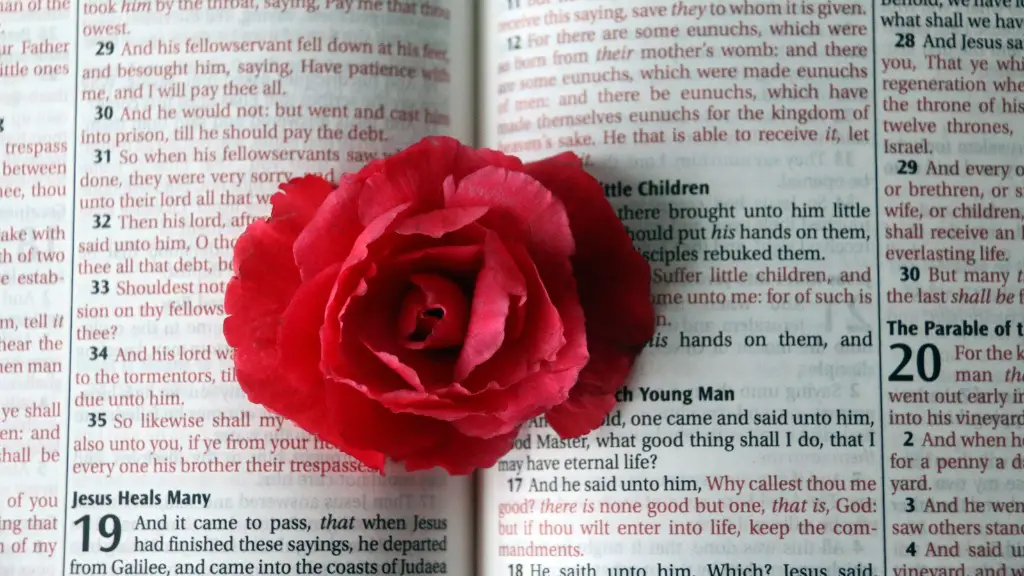Introduction: The Bible is full of teachings about the importance of community and being a part of something larger than oneself. From the very beginning stories of Adam and Eve in the Garden of Eden to the early Church communities of Pentecost and beyond, the Bible speaks of the benefits of being connected and a part of something bigger. From the individualistic lives we often lead today, it is easy to forget that being part of a community is an essential part of our spiritual, emotional and psychological wellbeing. This article will explore what the bible has to say about community, exploring how it forms the basis of our social structure and how it provides us with a sense of support and belonging.
What The Bible Says About Community ?The Bible speaks frequently about the importance of being part of a community, starting from Noah’s Ark. In the book of Genesis, the flood was saved by Noah’s family building a community that helped them to survive. The Bible also speaks of the importance of true friendship – with Proverbs 18 promising us ‘a friend loves at all times’. Throughout the Bible, there are stories of people coming together in communities to help and comfort each other in times of need. One of the best Biblical examples of community is the early Church and the account of Pentecost, when the Holy Spirit was poured out and “all were filled with the Holy Spirit and began to speak in other languages” (Acts 2:4). From this, we can see that the Bible values coming together with other people in order to build strong and lasting bonds.
Benefits of Community :The Bible teaches us much about the many benefits of being part of a community. In the Bible, community is a source of strength, with individuals coming together to help and take care of one another. It is also a source of connection and comfort, with the early Church being a living example of how we can be a support system for one another. We are reminded in 1 Peter 4:8-9 that “Above all, love each other deeply, because love covers over a multitude of sins. Offer hospitality to one another without grumbling.” These words remind us of the power and importance of sharing love and offering hospitality in our communities.
How to Apply These Principles :Being part of a community can help to improve our mental, emotional and spiritual wellbeing. We can start by reaching out and making connections within our own community. We can get involved in local organisations that can help us to build relationships with those in the same neighbourhood. We can also volunteer and give back to our community – such as helping to clean up parks, or getting involved in community projects. We can also practice hospitality and loving others within our local communities. This might include being a listening ear or offering small acts of kindness. Additionally, we can open our minds and hearts to people in other communities, who may have different experiences, beliefs and cultures.
The Role of Prayer and Unity Within a Community
The Role of Prayer :The Bible also highlights the importance of prayer for a community. Throughout the Bible, prayer is a way of connecting with God and expressing our needs and desires. It is also a way of bringing a community together, uniting individuals in a common cause. In the New Testament, we can read of the power of communal prayer – from Jesus’ own prayer of unity in John 17:21-23 to Paul’s letters urging his Christian communities to be in agreement and prayer (Romans 15:5-6, 1 Timothy 2:1-4). This shows us that prayer can bring individuals together, helping to nurture a sense of unity and closeness within a community.
The Role of Unity :Unity is another important part of a healthy community. In 1 Corinthians 1:10-13, Paul talks of the importance of maintaining unity, even when there are disagreements. He encourages us to “Be of the same mind. Do not be haughty, but associate with the lowly. Do not be wise in your own opinion.” This teaches us of the power of staying united, even when our own opinions don’t always align. It also speaks of the importance of including ‘the lowly’ – those who may find it difficult to fit into other communities – as a way of nurturing deeper understanding, empathy and respect in our own communities.
The Practice of Mutual Respect and Giving
The Practice of Mutual Respect :The Bible also teaches us about the need for mutual respect in a community. In Leviticus 19:18, we are reminded to “love your neighbour as yourself”, which encourages us to value and respect other members of the community. This can include treating those in the community with kindness and understanding, listening to the perspectives of others, and finding ways to show genuine care and concern for one another. By practicing mutual respect, we are able to build strong and trusting relationships within our communities.
The Practice of Giving :Finally, another biblical teaching about community is the importance of giving. In the Bible, we are reminded of the need to “give of your abundance,” (Proverbs 11:24) which speaks of the power of giving, not just in order to receive, but as a way of providing others with support and assistance. FromJames 2:14-17, we are also reminded of the importance of taking care of those in need, being generous and showing kindness. This encourages us to think of ways that we can give back to our community and make a positive difference to those around us.
The Power of Generosity and Forgiveness
The Power of Generosity :Generosity is also highlighted in the Bible as an important part of being part of a community. In Luke 6:38-40, we can read that “give, and it will be given to you. Good measure, pressed down, shaken together, running over, will be put into your lap. For with the measure you use it will be measured back to you.” This speaks of the need for giving generously to those in need, as a way of expressing our love for our communities. It reminds us of the power of being generous, not just with our possessions, but also with our time, energy and other resources.
The Power of Forgiveness :Finally, forgiveness is another important part of a healthy community. In Matthew 6:14-15, Jesus teaches us that “If you forgive others their trespasses, your Heavenly Father will also forgive you. But if you do not forgive others their trespasses, neither will your Father forgive your trespasses.” These words remind us of the power of forgiveness and how it can help to heal community relationships. We are encouraged to recognise any wrongs that may have happened, showing compassion and grace, and finding peace and healing within our communities.
The Benefits of Community Accountability and Prayer
The Benefits of Community Accountability :The Bible also speaks of the importance of accountability within a community. 1 Timothy 5:17-18 reminds us of the need to hold each other accountable, as a way of promoting justice and freedom from oppression. Accountability also helps to foster mutual respect and trust, and encourages us to be living examples of love and care for each other. It also reminds us of our need to seek justice and fairness in our communities.
The Benefits of Prayer :Prayer is also a powerful tool for creating and sustaining communities. Prayer can bring communities together in a way that words cannot, as a way of encouraging deeper understanding and love between members. It is also a way of expressing our desires and needs, and of connecting with one another in times of hardship and joy. Lastly, prayer also serves as a reminder of our need to trust in God and provide our communities with His grace and support.
Conclusion
The Bible speaks of the power and importance of community, with its stories and teachings encouraging us to come together with others and form strong and lasting relationships. It highlights the need for love, respect, and giving, as well as the importance of mutual accountability, unity and prayer. By applying these biblical teachings to our own lives, we can begin to build stronger and healthier communities, as a way of enriching our own lives, providing us with connection and support, and bringing us closer to God.



